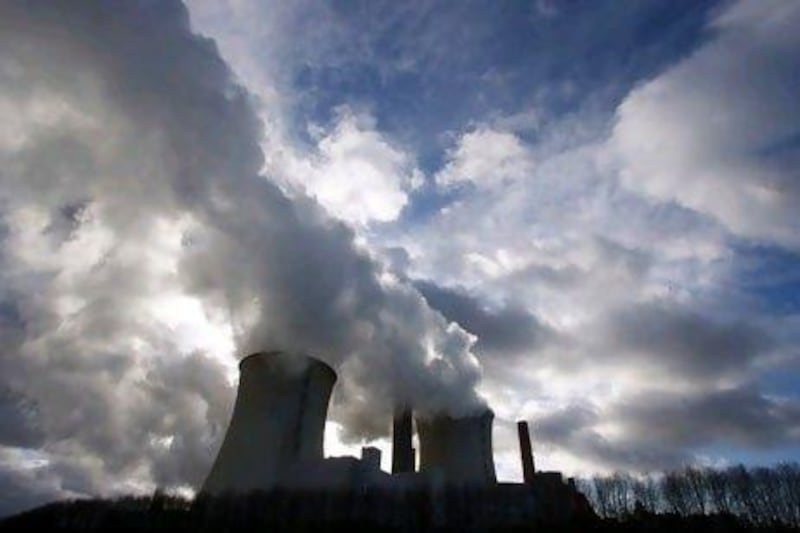Germany will extend the life of coal-fired power stations to replace supply from the nuclear plants that could be shut down in the wake of the Fukushima disaster in Japan.
The three-month moratorium on seven nuclear power stations could be made permanent, and the rest of the country's nuclear stations will be shut down by 2020, a decade earlier than planned, according to Juergen Becker, the German environment and nuclear safety secretary.
"The present discussion in Germany goes in the direction that the nuclear power plants that have been closed down during the moratorium will not be put back into operation - but they will be shut, closed down," Mr Becker said on the sidelines of an International Renewable Energy Agency summit in Abu Dhabi. "What will have to happen is that still-existing coal power plants, their operational time will have to be extended for some time, which will be a bad thing for our [carbon dioxide emmission] balance."
He made his comments as UAE officials explained its nuclear energy programme to other nations during a two-week meeting at the International Atomic Energy Agency, the global nuclear watchdog, in Vienna.
Of the countries that have reconsidered nuclear power since last month's earthquake and tsunami in Japan that triggered a partial meltdown and radiation leakages, none have reacted as strongly as Germany.
No decision has yet been taken on the future of the seven reactors. That hinges on the findings of two commissions set up last month by Angela Merkel, the chancellor. The Nuclear Safety Commission will be responsible for technical inspections for all German plants. Mrs Merkel has said she would provide a new energy plan by mid-June.
"The risks were well known before Fukushima, but Germans in general are sensitive of these issues," said Stefan Gsanger, the secretary general of the World Wind Energy Association, an industry group based in Germany.
Germany had originally committed to close its last nuclear reactor by 2022. But in September the government extended that date to 2036.
Before the moratorium, nuclear power accounted for more a quarter of Germany's electricity supply. Renewable energy and modern coal-burning plants originally intended to replace older coal-burning plants will have to make up the lost power.
"The situation has somewhat shifted because these new efficient power plants were built to replace old, inefficient coal power plants, but now we will need them to replace nuclear power," Mr Becker said. "Then we will have to make an extra effort to replace these old coal power plants by renewables. By the end of approximately 2020, we will have filled the gap and all the nuclear power plants can be shut down."
He declined to put a figure on the total cost of the required investment.
Germany intends to replace nuclear power, considered by many to be a clean energy source, even while meeting a target to cut emissions by up to 95 per cent by 2020, compared with 1990 levels.
The country has had to import electricity since the moratorium, according to the state utilities association. But wiping 7,000 megawatts from domestic production has not hurt Germany's industry, Mr Becker said.
"There's no problem at all, because we used to have an export of electricity," said Mr Becker. "All the lights are on in Germany."
But an early phase-out would be costly to its four biggest energy companies, which will lose an estimated €500 million (Dh2.6bn) from the moratorium alone. On Friday, the utilities company RWE sued a state in Germany where the company had a plant under moratorium.
Germany's planned phase-out comes as countries in the GCC contemplate producing nuclear power for the first time, with the UAE in the lead. Abu Dhabi has broken ground on the proposed site of a US$20 billion (Dh73.45bn) nuclear plant, set to begin producing power as early as 2017.
* additional reporting by David Crossland





